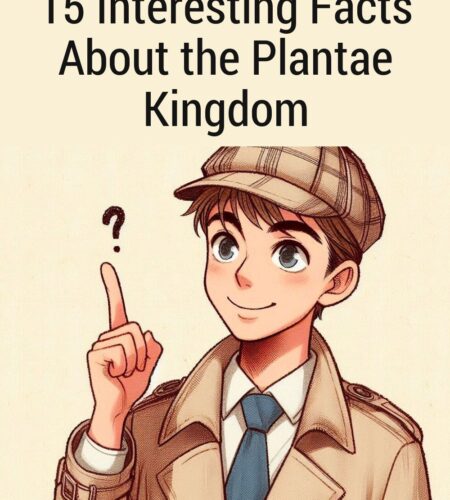Introduction:
The Plantae kingdom, as one of the five kingdoms of life, is an extraordinarily diverse and extraordinary group of organisms. From tiny grasses to tall trees, the Plantae kingdom has been supplying the world with food, resources, and oxygen for millions of years. But what exactly makes up the Plantae kingdom? Here are 15 interesting facts about the Plantae kingdom that you may not have been aware of.
Fact 1: Plants are a major source of oxygen
Plants are one of the key components of the Earth’s oxygen cycle. Through the process of photosynthesis, plants convert the carbon dioxide present in the air into oxygen and release them into the atmosphere. This oxygen is necessary for life to exist on Earth, and it is estimated that over a third of the oxygen we breathe is produced by plants.
Fact 2: Plants can survive in diverse environments
From deep underwater to high mountains, plants are incredibly adaptable and can survive in a wide variety of environments. Cacti and other desert shrubs can survive in the hottest and driest of climates, while aquatic plants can survive and thrive in the depths of the ocean.
Fact 3: Plants are proven to benefit human wellness
Studies have shown that having plants in your home or workspace can reduce stress, improve air quality, and even reduce mental fatigue. In addition, plants are known to increase productivity and help with focus. So, if you want to boost your performance, try keeping some plants around!
Fact 4: Plants are incredibly diverse
The Plantae kingdom encompasses an incredibly diverse array of organisms. This includes lichens, ferns, mosses, flowering plants, conifers, and even carnivorous plants. There are thought to be over 300,000 species of plants, making it one of the most varied and impressive kingdoms of life.
Fact 5: Plants have provided humans with food and medicine for centuries
Humans have been using plants for medicinal and culinary purposes for millennia. From the earliest days of our species, humans have developed a rich and varied cuisine with plants, and in many cultures, natural plant-based medicines are still used to this day.
Fact 6: Plants have an ancient evolutionary history
Modern plants are descended from some of the oldest living organisms on Earth. Fossil records indicate that some plants have been in existence for over 420 million years, and during this time, plants have adapted and evolved in order to better survive in their environment.
Fact 7: Plants can be found in almost every corner of the world
From tropical rainforests to the icy poles, plants can be found living in a wide range of environments. It is estimated that there are over 400,000 plant species inhabiting the planet, with an estimated 40,000 species living in the Amazon rainforest alone.
Fact 8: Plants generate their own food
Unlike animals, plants are able to generate their own food through the process of photosynthesis. During this process, plants use the energy from sunlight to turn carbon dioxide and water into glucose and oxygen. This glucose is then used by plants to synthesize other molecules, helping them to grow and thrive.
Fact 9: Plants use a variety of strategies to survive
Plants have evolved a wide range of strategies for surviving in their environment. Some plants use underground root systems to draw nutrients from the soil, while others use bright colors and unique smells to attract pollinators. Different species of plants use different strategies in order to ensure their survival.
Fact 10: Plants have existed for far longer than Humans
Our species is only estimated to be around 200,000 years old, while the first plants are thought to have appeared on Earth over 410 million years ago. This means that plants have had millions of years to evolve and adapt, versus the mere 200,000 years humans have been around.
Fact 11: Plants have an incredibly complex anatomy
Though plants may look simple on the surface, they contain a complex and intricate anatomy. From their roots to their leaves, plants contain a wide range of organs and systems that help them survive in their environment. For example, the root system helps to draw in water and nutrients, while the leaves use photosynthesis to produce food and oxygen.
Fact 12: Some plants can produce their own fertilizer
Certain species of plants, such as legumes, are capable of producing their own fertilizer. These plants produce a special type of bacteria in their root systems which can fix nitrogen from the atmosphere and make it available to the plant as a nutrient. This allows them to survive in nitrogen-poor environments.
Fact 13: Plants can go dormant to survive harsh conditions
Certain plants, such as the cactus, are able to enter a dormant state in order to survive the harsh conditions of the desert. In this state, the plant conserves its energy and water, allowing it to survive and wait for the rainy season before emerging.
Fact 14: Plants provide habitats for other species
Plants play an important role in the environment, providing habitats and resources for a wide variety of other species. For example, trees and shrubs provide shelter and food for birds and insects, while aquatic plants provide habitats and resources for fish.
Fact 15: Plants are the building blocks of most ecosystems
From deserts to rainforests, plants are essential components of most ecosystems. Plants provide food and resources for other organisms, and in turn, are pollinated and dispersed by these other species. Plants are essential for maintaining healthy ecosystems, and for sustaining life on Earth.
Conclusion
The Plantae kingdom is an incredible and diverse group of organisms, and these 15 interesting facts about the Plantae kingdom provide just a glimpse of the complexity and variety of the group. From providing oxygen to sustaining a wide array of ecosystems, plants are a vital and irreplaceable part of life on Earth.
Subscribe to our email newsletter to get the latest posts delivered right to your email.



Comments